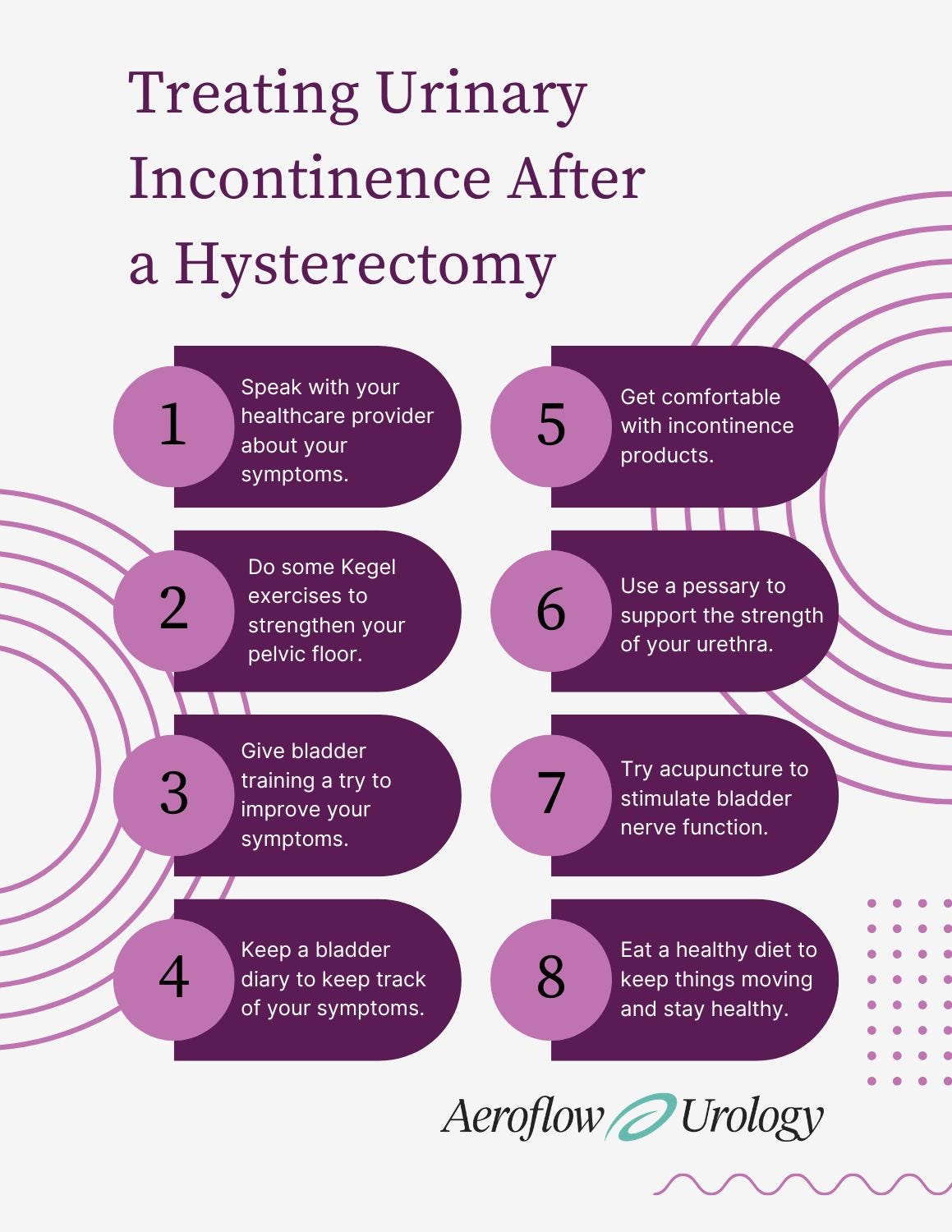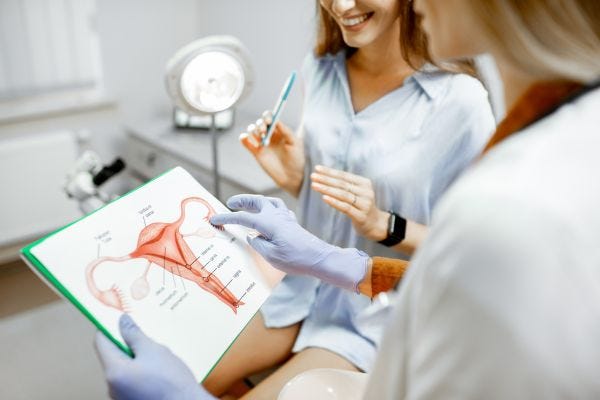Key Takeaways:
- Pelvic floor dysfunction is a prevalent complication following hysterectomies, with up to 60% of women experiencing urinary incontinence post-surgery.
- Hysterectomies may increase your risk of developing urinary incontinence UI due to damaged bladder nerves, removal of ovaries, and damage to the urinary sphincter.
- Kegel exercises, bladder training, and bladder control supplies may reduce symptoms of urinary incontinence after a hysterectomy.
Jump To:
Why Might I Need a Hysterectomy?
Why Do Hysterectomies Cause Urinary Incontinence?
How to Treat Urinary Incontinence After a Hysterectomy
How to Get Women’s Bladder Control Supplies Through Insurance
INCONTINENCE PRODUCTS THROUGH INSURANCE:
Aeroflow Urology is in-network with many Medicaid and Medicaid-managed insurance plans and is accredited by Medicaid. Complete our Eligibility Form, and we’ll automatically check to see if your plan covers incontinence supplies. ***Must meet certain requirements to qualify.***
You will also receive the care and attention every person managing incontinence deserves: A personalized list of 100% insurance-covered incontinence supplies, a dedicated Continence Care Specialist you can contact during business hours, a user-friendly online portal for easy monthly reordering, and educational content.
Get the continence care you need with the dignity you deserve. Join the Aeroflow Urology family today! It only takes 2 minutes to get started.
Did you know that the most common complication found among women who have undergone hysterectomies is pelvic floor dysfunction? Did you also know that hysterectomies increase the risk of incontinence in women?
If you're one of the 600,000 women who have had a hysterectomy and are experiencing these issues, don't worry! This post will explain why you're experiencing incontinence and provide 8 ways to manage it to regain your quality of life.
Why Might I Need A Hysterectomy?
A hysterectomy is a surgical procedure that involves the removal of the uterus, cervix, ovaries, fallopian tubes, or a combination of these parts.


Check Your Eligibility
2 Easy Steps
Discover the continence care essentials available through your Medicaid plan.
Hysterectomies are usually done to treat chronic menstruation pain, heavy bleeding, endometriosis, uterine fibroids (tumors that are not cancerous), pelvic organ prolapses such as uterine prolapse, cervical cancer, and uterine lining issues.
Your hysterectomy may cause side effects, including:
- Vaginal dryness.
- Menopause
- Urinary incontinence (UI).
- Hot flushes.
- Sleeping problems.
It’s important to remember that not all side effects of hysterectomies are negative; having the procedure done can significantly increase your quality of life if you’ve been suffering from pelvic pain, endometriosis, certain cancers, or heavy menstruation.
Why Do Hysterectomies Cause Urinary Incontinence?
UI is the loss of bladder control that commonly leads to urinary leakage, although it may not be experienced until years after you have your hysterectomy. Symptoms of UI may include:
- Leaking urine when coughing, sneezing, lifting heavy objects, or bending over.
- Feeling like you need to use the restroom more than usual.
- Feeling a sudden and intense urge to urinate, resulting in leakage.
You may experience UI symptoms following a hysterectomy because the procedure affects your pelvic muscles to a great degree. In fact, in an observational study, PubMed reported that 60% of women who undergo hysterectomies have an increased risk of experiencing UI. Other reasons you may experience UI post-surgery include:
- Your uterus is near your bladder nerves, and these nerves can sometimes become damaged during the removal of your uterus. Nerve damage is a common cause of incontinence.
- Your uterus keeps the pelvic floor muscles strong and helps support them so they don’t sag, which helps support your bladder. When your uterus is removed, the decrease in bladder support can lead to incontinence.
- Hysterectomies may damage your urinary sphincter, which helps hold your urine in and stops it from leaking. This can lead to incontinence and leakage.


- Your ovaries, which produce the hormone estrogen in your body, may be removed during the surgery. Estrogen helps support your pelvic floor muscles, so when the ovaries are removed and estrogen levels decrease, your pelvic floor weakens, leading to incontinence.
The types of incontinence you may experience depend on the type of hysterectomy you undergo, such as a total abdominal hysterectomy. However, the main types of incontinence you can experience after undergoing a vaginal hysterectomy are:
- Urge incontinence. Urge incontinence is also known as overactive bladder (OAB.) This kind of incontinence is characterized by the sudden and uncontrollable urge to pee and frequent urination. In addition, urge incontinence can cause leakage.
- Stress urinary incontinence (SUI). SUI is common among women who have hysterectomies. SUI happens when you leak urine when engaging in certain physical activities such as coughing, sneezing, laughing, lifting heavy objects, or exercising.
How to Treat Urinary Incontinence After a Hysterectomy
There are many ways you can decrease your risk of developing incontinence and manage your symptoms at home and with the help of women's health professionals.
1. Speak With Your Healthcare Provider
You should never be embarrassed about incontinence! It is widespread among women who have had hysterectomies, but it's also common among women in general.
In a meta-analysis from The Lancet Journal, it was found that 3,500 women reported incontinence in the US. It's also known that 75% of women age 65 and older are at higher risk of incontinence.
Your healthcare provider can provide treatment options and help you make a plan to manage your incontinence. If you're experiencing incontinence after a hysterectomy, you should always make a follow-up appointment with your provider.
2. Do Some Kegel Exercises
Kegels are a type of pelvic floor exercise that can help increase pelvic floor strength and help you to regain bladder control. They are easy to do at home after recovering from an operation. You may also benefit from seeing a professional like a pelvic floor physical therapist.
3. Give Bladder Training a Try
Bladder training involves holding urine for longer periods, even when you feel like peeing. By urinating on a timed schedule, you can increase the time you can hold your urine and wait between visits to the bathroom.
To begin bladder training, hold your urine for 5 minutes every time you feel like urinating. After, you can hold it for 5 minutes, double that time to 10 minutes, and so on. Eventually, you can hold your urine for much more extended periods.
4. Keep a Bladder Diary
Keeping a bladder diary may help you notice what's causing your incontinence and aid in bladder training. It may also be helpful for your provider when discussing your incontinence.
You should keep track of the following things in your bladder diary: The time you voided, how much fluids you drank, what activity you engaged in, and if you experienced leakage.
5. Get Comfortable With Incontinence Products
While you shouldn't be embarrassed to use incontinence products, standing in a store aisle, unsure of what incontinence products to buy can be unnerving.
Adult briefs, pull-on underwear, and bladder control pads are great ways to manage your leakage. Plus, if you use Aeroflow Urology's services, you may be eligible to receive incontinence products for free. Your insurance may cover your incontinence products, and you'll get a curated shopping list to choose supplies from. All you have to do is fill out our simple Eligibility Form to see if you qualify.
6. Use a Pessary
A vaginal pessary is a flexible, removable device inserted into your vagina. The pessary helps hold up your urethra, improve your urine flow, and catch leakage. Speak with your healthcare provider about getting a vaginal pessary.
7. Try Acupuncture
While extensive clinical trials are needed for more conclusions, one study found acupuncture for incontinence post-hysterectomy to be effective and safe.
The study found acupuncture to be an effective treatment for incontinence because acupuncture stimulates muscles and nerves and can regulate their functions. Bonus— acupuncture was also found to relieve constipation.
8. Eat a Healthy Diet
Eating healthy foods and bladder-friendly foods can help you recover after major surgery and improve your overall bladder health. Eat fresh vegetables and fruits, consume lots of fiber, drink enough water, and avoid bladder irritants, such as spicy foods, alcohol, caffeine, and certain citrus fruits.
The Hysterectomy and Incontinence Connection. (2016, June 20). Healthgrades. https://www.healthgrades.com/right-care/overactive-bladder/the-hysterectomy-and-incontinence-connection
Wilke, M. (n.d.). Will I suffer from a leaky bladder after a hysterectomy? Health24. https://www.news24.com/health24/medical/incontinence/incontinence-in-women/will-i-suffer-from-a-leaky-bladder-after-a-hysterectomy-20190408
Brown, J. S., Sawaya, G., Thom, D. H., & Grady, D. (2000). Hysterectomy and urinary incontinence: a systematic review. The Lancet, 356(9229), 535–539. https://doi.org/10.1016/s0140-6736(00)02577-0
Magos, A. (2007). Does hysterectomy cause urinary incontinence? The Lancet, 370(9597), 1462–1463. https://doi.org/10.1016/s0140-6736(07)61613-4
Sun, J., Zhang, X., Cao, T., & Song, Y. (2019). Treatment of urinary incontinence after total hysterectomy with acupuncture: A case report. Medicine, 98(20), e15687.https://doi.org/10.1097/MD.0000000000015687
Information provided on the Aeroflow Urology website is not intended as a substitute for medical advice or care from a healthcare professional. Aeroflow recommends consulting your healthcare provider if you are experiencing medical issues relating to incontinence.








